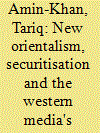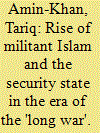| Srl | Item |
| 1 |
ID:
116844


|
|
|
|
|
| Publication |
2012.
|
| Summary/Abstract |
The new Orientalism idea is predicated on the clash of civilisations thesis of Samuel Huntington and others-an outlook which has spread swiftly in Western states since September 11. I explore the implications of the new Orientalism and the assertion of white supremacy for diaspora Muslims in Western societies. Its expression in the media in the form of raced and gendered portrayals and demonised cultural representations of Muslims and Islam, with the accompanying assumption of the superiority of Western culture, is identified here as incendiary racism. This racism also underpins the simultaneous vilification of Muslims and Islam, a claim supported by my analysis of media coverage of the 'niqab debate', terrorism and sports. Thus, at one level, I analyse the Western media's depictions. At another, I examine the consequences of securitisation and the Long War, and critically assess the argument that securitisation has existed from time immemorial and represents nothing new-which leads me to challenge its ahistorical assumptions, and the treatment of the securitiser and the securitised as coeval.
|
|
|
|
|
|
|
|
|
|
|
|
|
|
|
|
| 2 |
ID:
089510


|
|
|
|
|
| Publication |
2009.
|
| Summary/Abstract |
This paper distinguishes between political and militant Islam and analyses the latter's current ability to confront empire and to become a social force in Muslim-majority states. This analysis is within the dialectic of collaboration and resistance, starting with client postcolonial states' pivotal role in bringing to fruition the collaboration between political Islam and US imperialism during the cold war era. The post-cold war period signals the imperialist putsch to confront militant Islam in the 'Long War' by employing the cold war strategy of 'permanent war' and universalising the idea of the security state. Militant Islam's resistance to the Long War and the security state makes this two-pronged imperial strategy a losing proposition for the USA. Paradoxically this strategy has also become the prime mover for militant Islam's ascendancy. The paper addresses the paradox of the USA's continuation with its losing Long War strategy and securitisation agenda which, although providing succour to militant Islam, is also achieving its larger objectives to buttress capitalist globalism; fuel the military-industrial and security-industrial complexes; and support 'big oil'.
|
|
|
|
|
|
|
|
|
|
|
|
|
|
|
|